Rail passengers have experienced the first of several days of travel chaos as union members strike in a bitter dispute over pay, jobs and conditions.
Around 40,000 members of the Rail, Maritime and Transport (RMT) union at Network Rail and 13 train operators walked out.
London Underground workers also took action on Tuesday, while RMT members will also strike on Thursday and Saturday.
Knock-on delays and disruption are expected on Wednesday, Friday and Sunday.
It is thought to be the biggest outbreak of industrial action on the railways for a generation, with just one in five trains running on strike days, mainly on main lines and only for about 11 hours.
6.30pm
The largest rail strike for a generation caused severe disruption on Tuesday, with more cancellations happening on Wednesday.
Many passengers’ journeys took several hours longer than normal, while those who chose to travel by car instead were greeted by a surge in traffic.
Just a fifth of trains ran on Tuesday and half of all lines were closed.
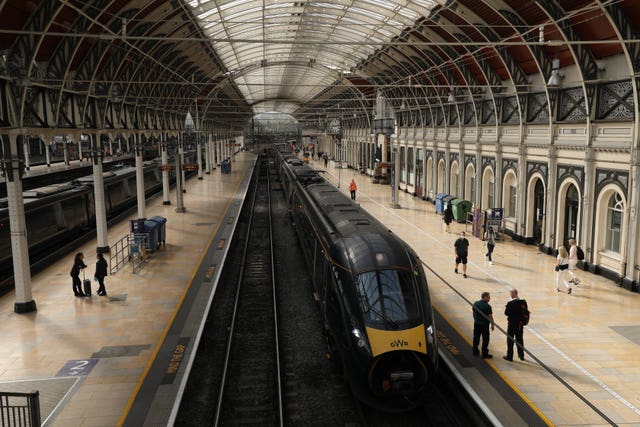
Last trains were much earlier than normal, such as London Euston to Glasgow at 1.30pm and London King’s Cross to Edinburgh at 2pm. The network was due to shut down at 6.30pm.
The chaos will continue on Wednesday, with only 60% of trains running, mainly due to a delay to the start of services as signallers and control room staff are not doing overnight shifts.
Talks between the RMT, Network Rail and train companies will resume on Wednesday.
6.06pm
Vauxhall railway station was quiet amid the strike action.
Although a service to Waterloo still ran every 15 minutes, the platforms had only a few commuters waiting.
Hospital food supply worker Marie, from Chingford, Essex, told the PA news agency she was forced to walk for 40 minutes from Liverpool Street to Waterloo on Tuesday morning.
“On a day like today it’s OK, but it’s not ideal is it?”
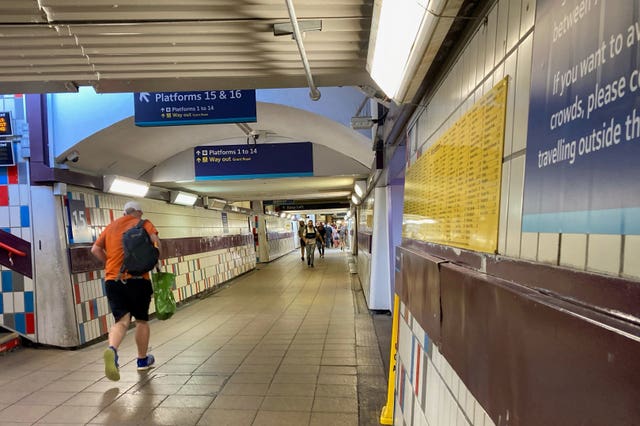
She said it was not possible for her to work from home, adding: “I am sorry, but I don’t have any sympathy for those that were on strike because there are loads of people who have worked right through the pandemic, myself included.
“We can’t go on strike just at the drop of a hat so I don’t have any sympathy.”
She said she did not know how she was going to get home: “Now I’m in a hurry to get home because the trains aren’t running the other way and I don’t know how I’m going to get home.”
5.52pm
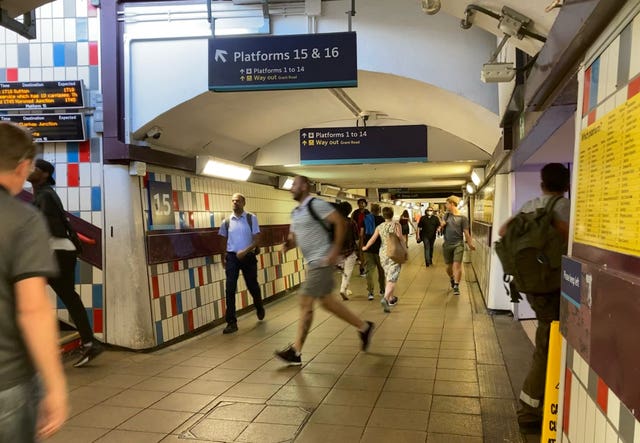
A surge of passengers could be seen running through Clapham Junction station in south-west London on Tuesday evening to catch trains, which have been running at severely reduced services.
The usually bustling commuter hub, which was eerily quiet during the day, became slightly busier during the evening rush hour as people boarded trains on the branch towards Windsor or Southampton.
One man could be heard saying: “Nobody knows how to walk”, as he rushed through the crowd on his way towards a platform.
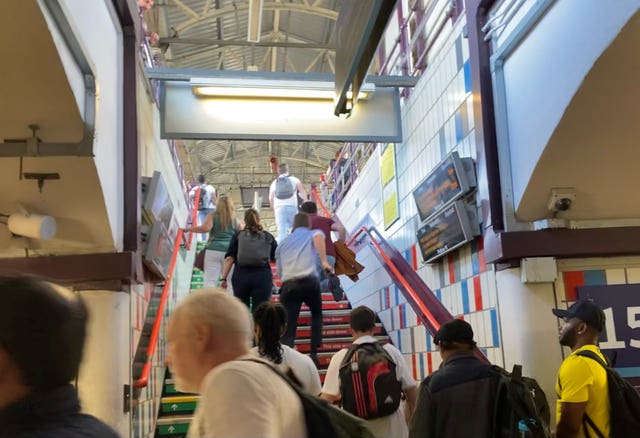
5.46pm
The roads have been busier today, according to figures, and photographs show traffic in the capital.
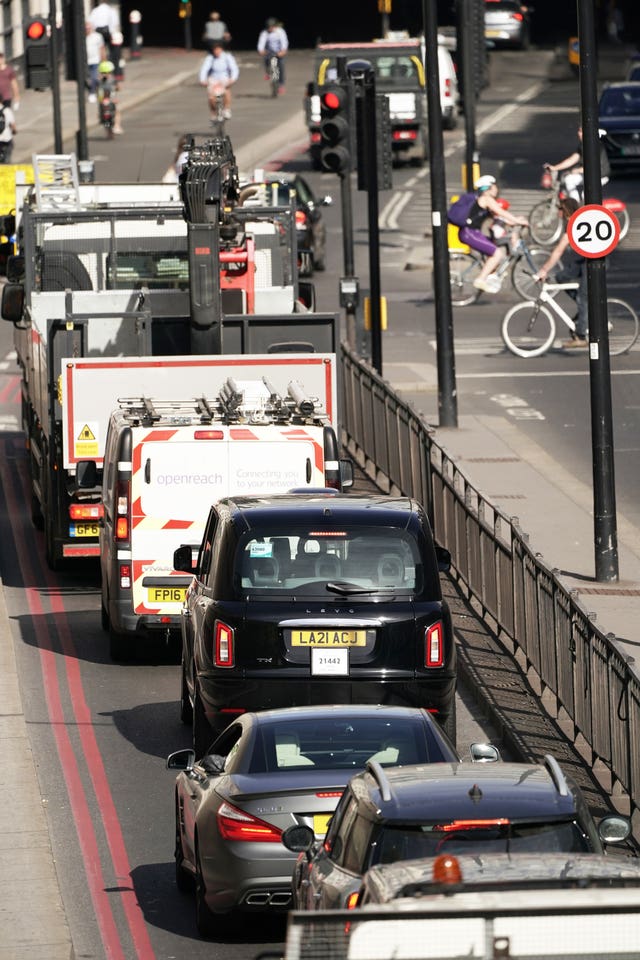
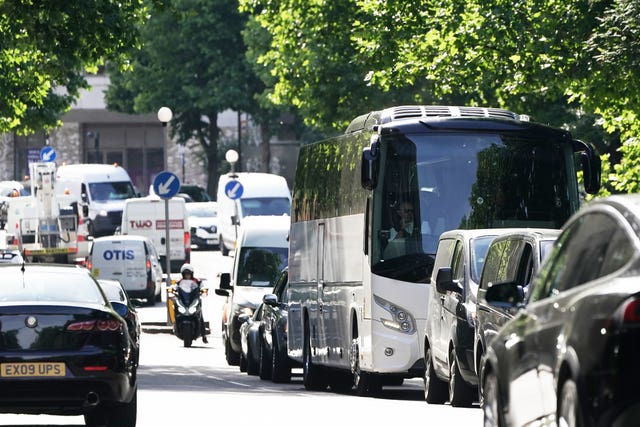
5.43pm
The disruption will continue tomorrow, even though it isn’t a strike day.
⚠️ 1/2 There will be significant disruption across the country tomorrow, due to the reopening of Network Rail signal boxes at different times throughout the day, following today's strike action by Network Rail RMT members. Services will start later than normal due to this. pic.twitter.com/NI7Kln8gbN
— ScotRail (@ScotRail) June 21, 2022
5.39pm
We’re at the height of rush hour and many will be making their way home via alternative methods.
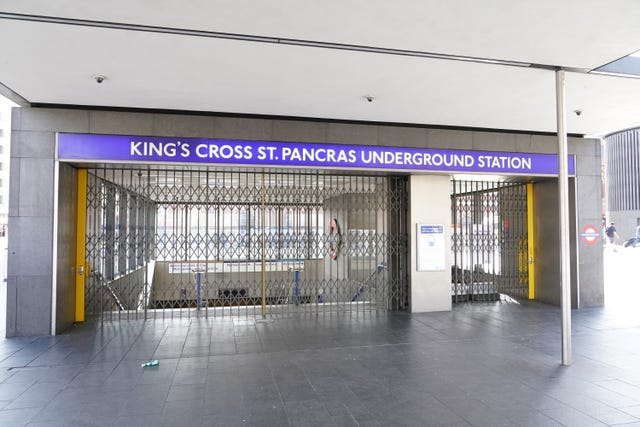
5.30pm
Fewer than four in 10 adults are supportive of the rail workers’ strike, while more than four in 10 said they opposed the action, according to polling firm YouGov.
The poll of 2,516 adults published on Tuesday afternoon suggested two-thirds (66%) of those aged 65 and above were opposed to the action, compared to almost half (48%) of those aged 18 to 24 supporting the strikes.
Some three in five (60%) also said they were opposed to suggestions of closing manned ticket offices at most railway stations.
5.17pm
Clapham Junction station in south-west London – usually one of the busiest train hubs in the country – remained quiet ahead of the evening rush-hour.
Dozens of people were waiting on chairs on platforms and walkways for trains, which are running at a reduced service to a limited number of destinations.
A Tannoy announcement every few minutes reminded passengers to travel only if “absolutely necessary”.
Outside the station, traffic was flowing normally and bus stations were relatively empty.
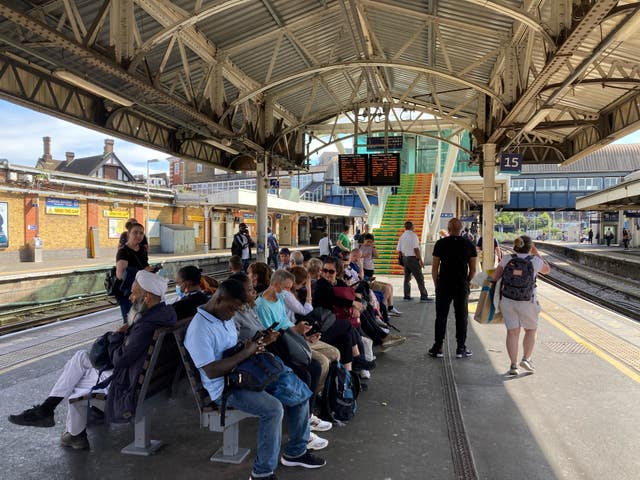
5.09pm
Traffic on the roads was busy as commuters tried to find other ways to travel to and from work.

4.49pm
Pictures show Jubilee line trains parked at the London Underground Stratford Market Depot in London.
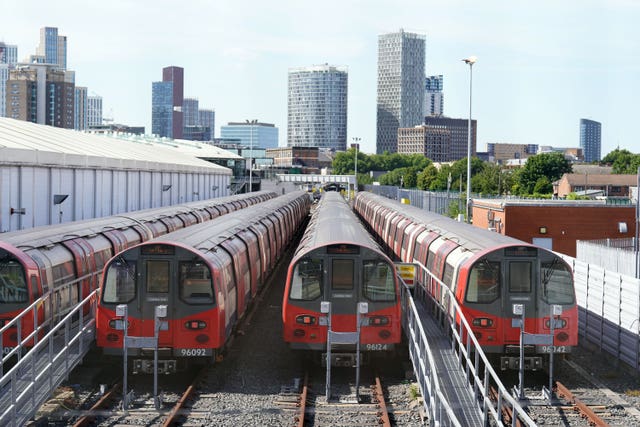
4.47pm
RMT general secretary Mick Lynch said the turnout at picket lines “has been fantastic and exceeded expectations”.
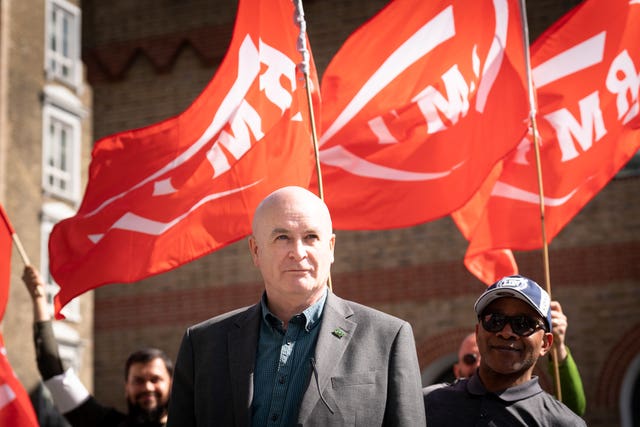
RMT General Secretary Mick Lynch on today's rail strike:"@RMTunion members are leading the way for all workers in this country who are sick and tired of having their pay and conditions slashed by a mixture of big business profits and government policy."https://t.co/XWU43zdz8h pic.twitter.com/ikvMTGmLkt
— RMT (@RMTunion) June 21, 2022
4.36pm
Carla Denyer, co-leader of the Green Party, said the Government “provoked this strike as part of their politics of division”.
Shapps is trying to portray the #RailStrikes as a clash:commuters & tax-payers vs rail workers.
That’s not how it looks from where I’m sitting.
Govt has provoked this strike as part of their politics of division. No wonder @RMTunion members voted 89% to strike. I support them pic.twitter.com/oz6lImCw9R
— Carla Denyer (@carla_denyer) June 21, 2022
4.34pm
Conservative MP for Southend West, Anna Firth, says exam boards AQA and Edexcel “are not accepting the strikes as mitigation for exams” and that “no student should have their education disrupted like this”.
She said the strikes “have caused unacceptable levels of disruption to people throughout the country”.
🚂Today's Rail strikes have caused unacceptable levels of disruption to people throughout the country
👩🎓@AQA and @PearsonEdexcel are not accepting the strikes as mitigation for exams
🎓No student should have their education disrupted like this pic.twitter.com/jwP7TkPs5w
— Anna Firth MP (@Anna_Firth) June 21, 2022
4.15pm
Services at Shenfield in Essex are affected by a problem on the line.
❗ #Shenfield – Two freight trains have blocked themselves from moving onwards. The lengths of the trailers of both trains are crossing the points and track where the need to travel over.
— Greater Anglia (@greateranglia) June 21, 2022
National Rail said disruption is expected until 6pm.
⚠️NEW: Disruption through #Shenfield expected until 18:00
— National Rail (@nationalrailenq) June 21, 2022
3.56pm
As we head towards the evening rush hour, Green MP Caroline Lucas has also urged Transport Secretary Grant Shapps to “get round the table” with unions bosses and negotiate.
Solidarity to all rail workers who've been driven to strike in defence of jobs, fair pay and safer railways for us all – @grantshapps, get round the table now! pic.twitter.com/A4gezjmAwg
— Caroline Lucas (@CarolineLucas) June 21, 2022
3.52pm
The Prime Minister says the strikes are “so wrong and unnecessary” and that the Government supported railway workers during the pandemic.
The strikes today are wrong and unnecessary. pic.twitter.com/EPV9f3DiHs
— Boris Johnson (@BorisJohnson) June 21, 2022
3.48pm
A London pub boss says he is facing as much as a 25% plunge in sales as rail strikes hammer hospitality firms.
Clive Watson, founder of City Pub Group, said it is “barely worth opening” some sites near train stations, due to the impact of industrial action on Tuesday, Thursday June 23 and Saturday June 25.
He said: “We have seen events cancelled in droves and really weak bookings in a lot of places,” he said.
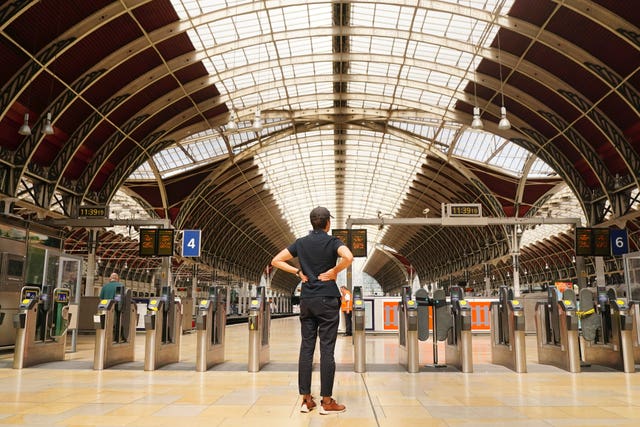
“In London it is obviously bad but we’ve also seen it in Bristol, Norwich, Exeter, Reading. In general, a large proportion of bookings are being cancelled, without plans for them to be rearranged too.
“It’s early days but I think we are expecting trade to be 20% to 25% down this week.”
3.39pm
Most people surveyed by YouGov are against this week’s strikes. Some 2,516 British adults were surveyed on the issue on Tuesday.
Britons tend to oppose the rail workers strikes taking place this week
All Britons Support 37% / Oppose 45%
Con voters Support 18% / Oppose 72%
Lab votersSupport 65% / Oppose 18%https://t.co/0J86iNrRWO pic.twitter.com/KHoARzP4tj
— YouGov (@YouGov) June 21, 2022
3.33pm
Neil Bibby, transport spokesman for Labour’s leader in Scotland Anas Sarwar, said he visited a picket line to listen to workers’ concerns – something he says Transport Secretary Grant Shapps “hasn’t once bothered to do”.
I joined rail workers today with @AnasSarwar to listen to their concerns. Something Grant Shapps hasn’t once bothered to do.
The Tories own this chaos & the cost of living crisis. They must take responsibility to end this dispute. Solidarity with @RMTunion. #ToryRailStrikes pic.twitter.com/iPl5iqzbeP
— Neil Bibby 🇺🇦 (@NeilBibby) June 21, 2022
3.29pm
The chief executive of Live – the voice of the UK’s live music business – said the industry “cannot take” the impact of ongoing train strikes.
Jon Collins told the PA news agency: “This is one of the biggest weekends of the year for live music fans, with Glastonbury and British Summer Time (festivals) both taking place for the first time in three years due to the pandemic.
“However, fans and staff now face severe delays and potential safety risks as they are forced to choose alternative routes.
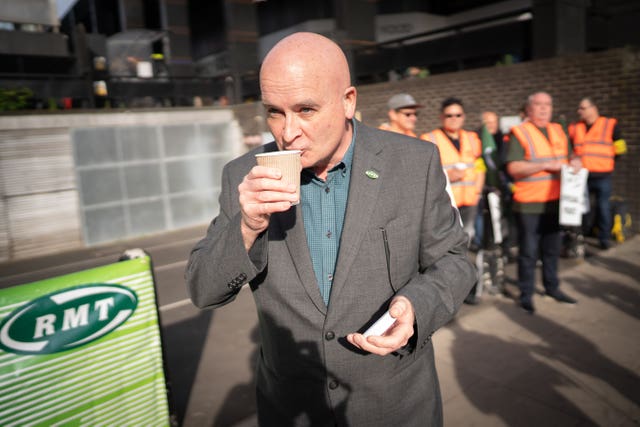
“While we recognise the legitimacy of this action, our sector is facing a perfect storm of fragile consumer confidence, rising costs, inflation, and supply chain issues, meaning we frankly cannot take the impact of further strikes threatened this autumn.
“On top of this week, any additional action will have hugely negative impacts on a sector that is already on a cliff-edge.”
3.25pm
Pupils have described their anxiety over getting to school for A-level and GCSE exams during the rail strikes.
The major industrial action is clashing with some exams set for Tuesday and Thursday.
The Department for Education has said exams are not expected to be rescheduled.
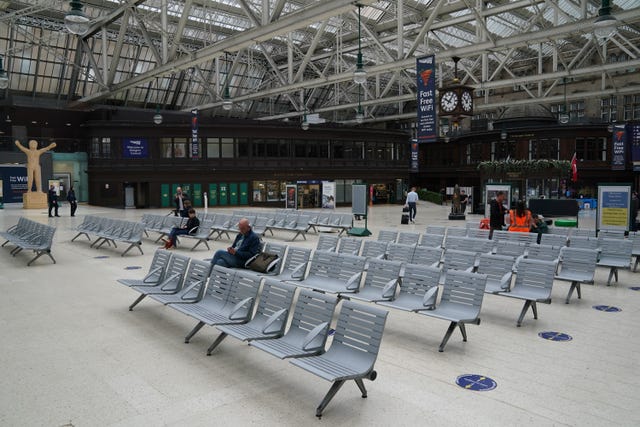
The father of an 18-year-old with his final A-Level exam on Thursday said his son has been “very anxious about how to get to school” for the test.
Johnny, 49, from the Westminster area of London, and who did not want to give his surname, said he will drive his son the 25 miles to school instead, setting out at around 6am to make sure he arrives on time.
A Department for Education spokesman said: “We recognise how concerning these strikes will be for students – particularly for those sitting GCSEs and A-levels.
“We know schools and colleges will draw on their existing contingency arrangements already in place to manage any possible disruption,” they added.
3.17pm
Labour MP for Sheffield Heeley and shadow secretary of state for transport, Louise Haigh, has called on her Government counterpart to sit down and talk with the unions to “resolve this dispute”.
Rail workers kept our country going during the pandemic.
They deserve fair pay and respect.
Grant Shapps should get around the table with them and resolve this dispute. pic.twitter.com/yrUQTqpwaU
— Louise Haigh (@LouHaigh) June 21, 2022
3.13pm
Britain’s train services will continue to be disrupted on Wednesday due to the knock-on effects of Tuesday’s strike.
Only around 60% of the 20,000 normal weekday services will be able to operate.
Walkouts by signallers and control room staff who would usually work overnight from Tuesday night into Wednesday morning means trains will leave depots later than normal, delaying the start of services.
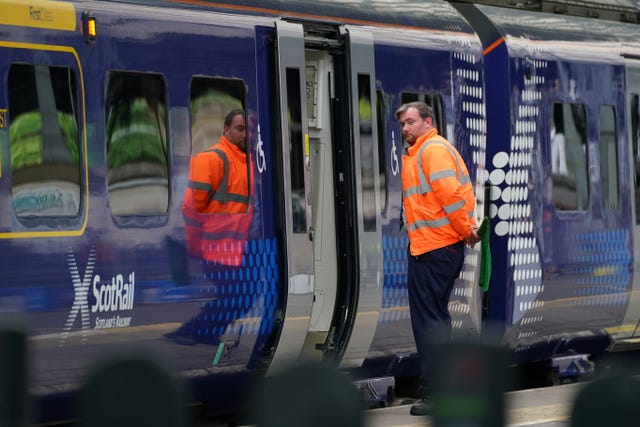
The process of taking trains out of depots will only begin when signallers on daytime shifts start work at 6-6.30am.
No passenger services will run before 6.30am.
3.02pm
Labour’s leader in Scotland expressed “solidarity” with striking rail workers as he visited a picket line following a warning from the UK party leader that frontbenchers should refrain from doing so.
Anas Sarwar and his transport spokesman Neil Bibby visited RMT members at Edinburgh Waverley.
Labour leader Sir Keir Starmer reportedly ordered frontbenchers not to join picket lines at train stations as the country faces its biggest rail strike in a generation.
Solidarity with those on the picket lines.
This is a crisis entirely of the Government’s making.
The workers don’t want strikes. The unions don’t want strikes. The public don’t want strikes.
They demand better. pic.twitter.com/PMZSfIyTwD
— Anas Sarwar (@AnasSarwar) June 21, 2022
A leaked memo revealed frontbenchers were told to “show leadership” by the Labour leader’s office.
It added: “And to that end, please be reminded that frontbenchers including [parliamentary private secretaries] should not be on the picket lines.
“Please speak to all the members of your team to remind them of this and confirm with me that you have done so.”
But Mr Sarwar has taken a different approach north of the border.
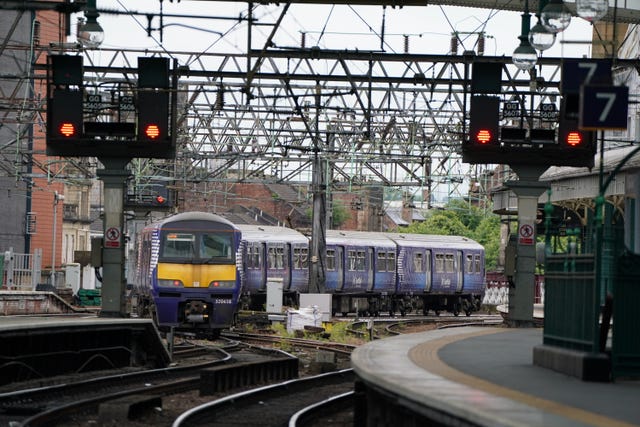
“Solidarity with those on the picket lines,” he said on Twitter.
“This is a crisis entirely of the Government’s making.
“The workers don’t want strikes. The unions don’t want strikes. The public don’t want strikes.
“They demand better.”
2.58pm
Dee Corsi, chief operating operator at New West End Company, which represents 600 retail, restaurant, hotel and property owners across central London, said the strikes are expected to bring London’s West End, and the wider country, to a “grinding halt”.
She said: “This will be a particular blow for commuters reliant on these services to get into the capital and other city centres for work, and retail and hospitality businesses that are already struggling with rising costs and staffing shortages.
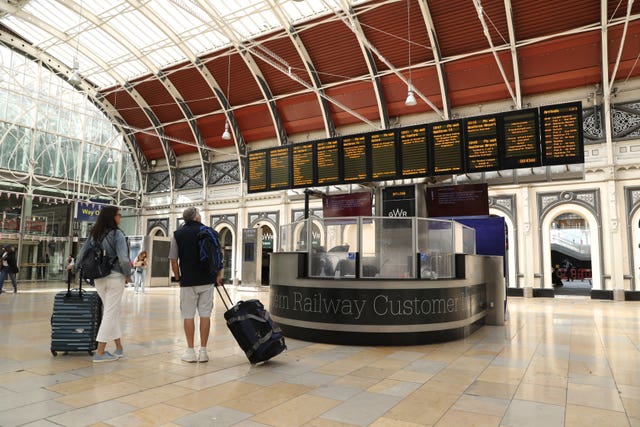
“With international visitor numbers still recovering from the impact of the pandemic, it is frustrating to see fresh disruptions that will deter much-needed domestic visitors.
“These strikes will hit our retail and leisure destinations at a time when they should be making the most of our first restriction-free summer since 2019.”
2.47pm
Ex-chancellor Ken Clarke told The World At One: “If the pay settlement is 10, 11% then you’re going to have vast amounts of the public sector induced to going for the same militancy, the same strike action in order to demand at least the same.”
Former chancellor Ken Clarke tells @Sarah_Montague the rail strike action cannot be allowed to look successful and if it continues, people will become tired of the disruption and "get angry at the government for not stepping in"#BBCWATO pic.twitter.com/1wpzPKRhUM
— The World at One (@BBCWorldatOne) June 21, 2022
2.40pm
Writer Ana Leorne says today’s disruption is the aim of the strike – not simply a byproduct of it.
i don't understand why people are complaining that the UK rail strike is "disruptive." the whole point of a strike is to be disruptive.
— Ana Leorne (@analeorne) June 21, 2022
2.29pm
Emma Best, the leader of Waltham Forest Conservatives, says the strike will make it “harder to negotiate a good deal for union members”.
The Government just bailed the rail industry out to the tune of £16bn, that is £600 per UK household.
In London, 15,000 staff members just got an 8.4% pay rise.
This strike only serves to cripple the rail industry & make it harder to negotiate a good deal for union members. https://t.co/RFnT68zxkU
— Emma Best AM (@emmabest22) June 21, 2022
2.24pm
Footfall in central London to 1pm today was 27% lower than last Tuesday and in city centres outside of the capital it was down by 11.2%, retail analysts Springboard said.
In contrast, footfall in outer London and market towns was less impacted, down 6.2% and 2% respectively, reflecting increasing numbers of people working from home, it said.
Diane Wehrle, insights director at Springboard, said: “The impact of train and Tube strikes today on footfall is very clear to see, with a large proportion of people clearly working from home.”
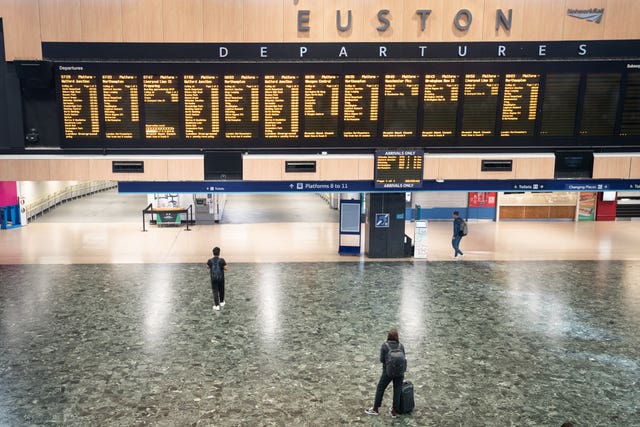
2.19pm
Plymouth Sutton and Devonport MP, Luke Pollard, has called on Government ministers to sit down with RMT chiefs.
No one wants rail strikes. The way to get a deal and end the strikes is by Ministers dropping their refusal to negotiate. Ministers need to do their day job, start talking and find a solution to a legitimate dispute they are deliberately politicising.
— Luke Pollard MP (@LukePollard) June 21, 2022
2.15pm
Elliot Eniton, 28, from Plumstead, south-east London, said the strike doubled his journey from Hertfordshire to his home.
He said: “Connections have been really, really poor.
“It’s always stressful making all these connections.
“Usually it takes me about an hour and 30 minutes but now I’m looking at three hours right now – double.”
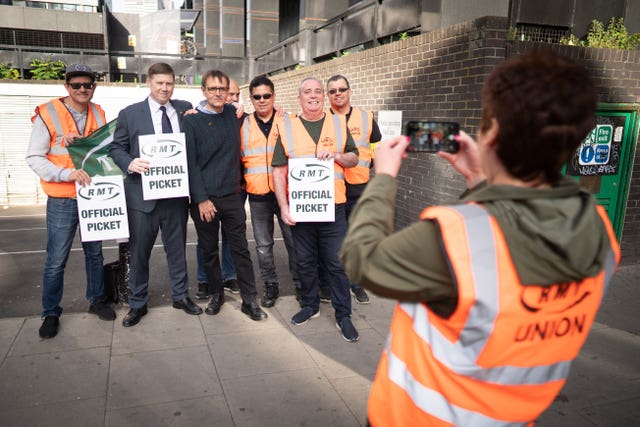








Comments: Our rules
We want our comments to be a lively and valuable part of our community - a place where readers can debate and engage with the most important local issues. The ability to comment on our stories is a privilege, not a right, however, and that privilege may be withdrawn if it is abused or misused.
Please report any comments that break our rules.
Read the rules here